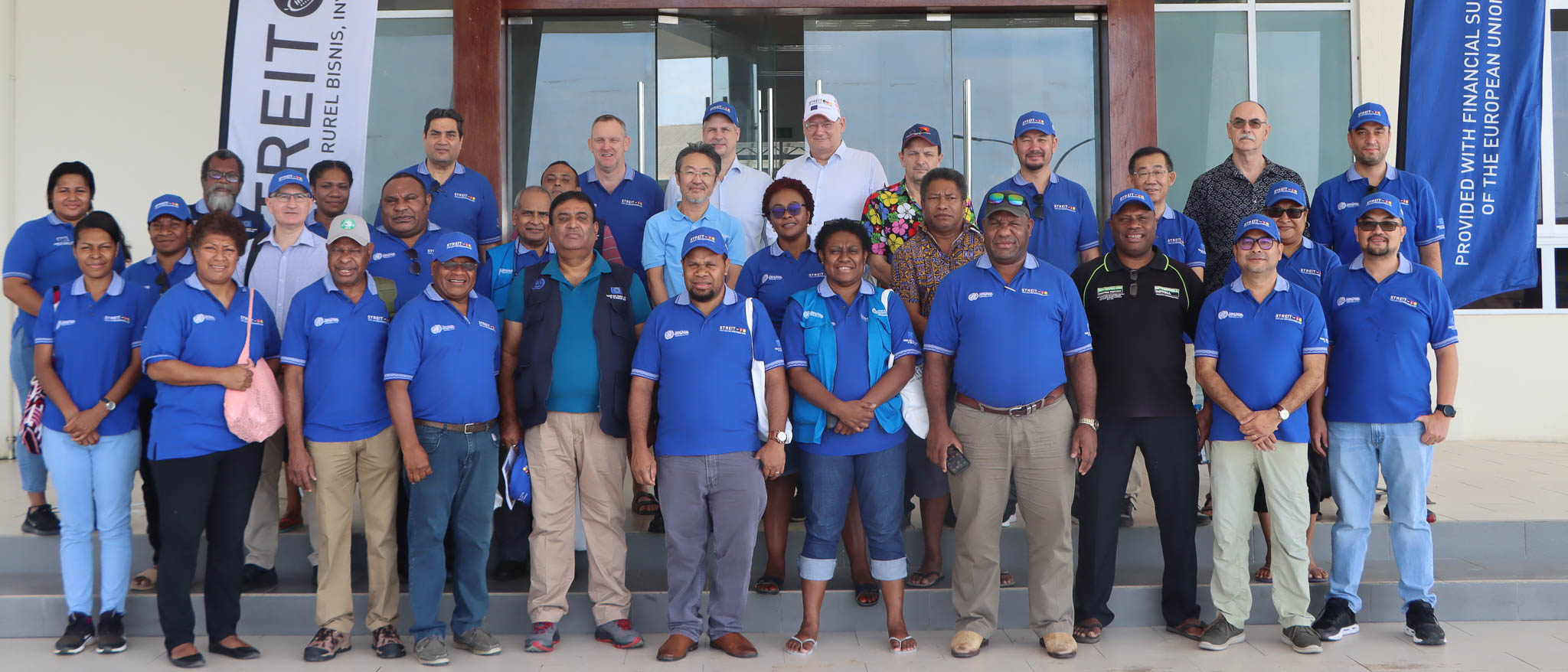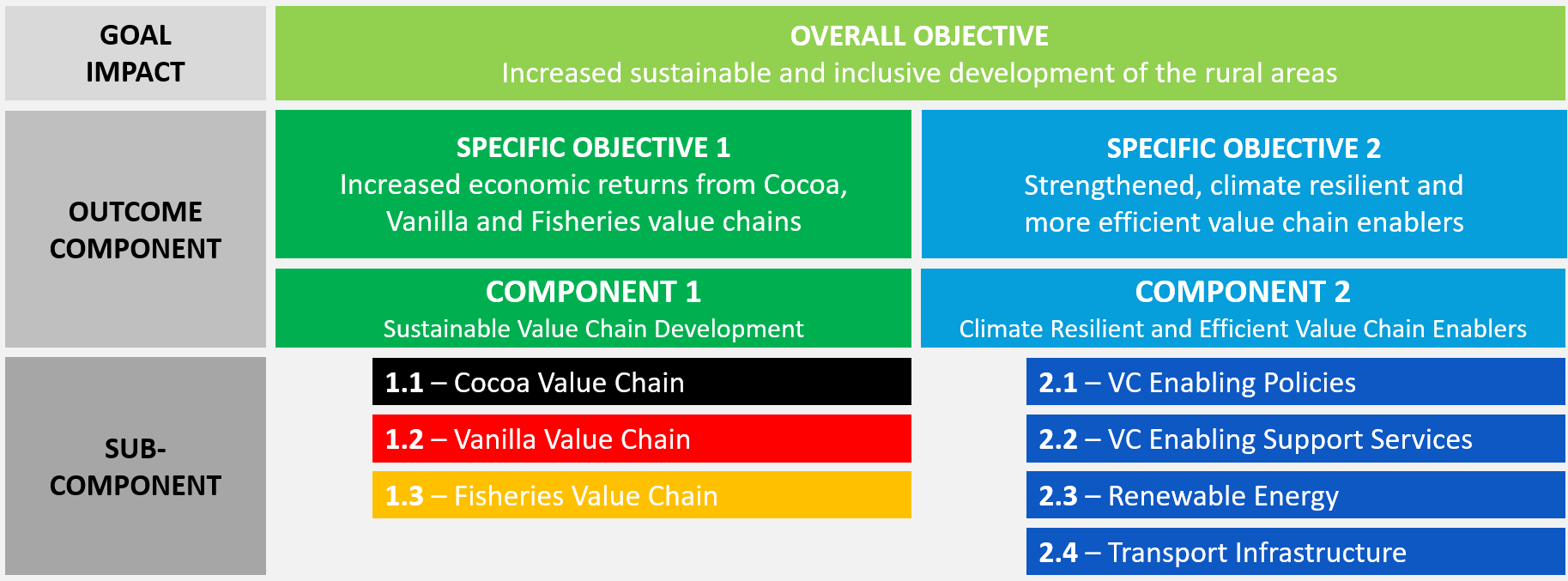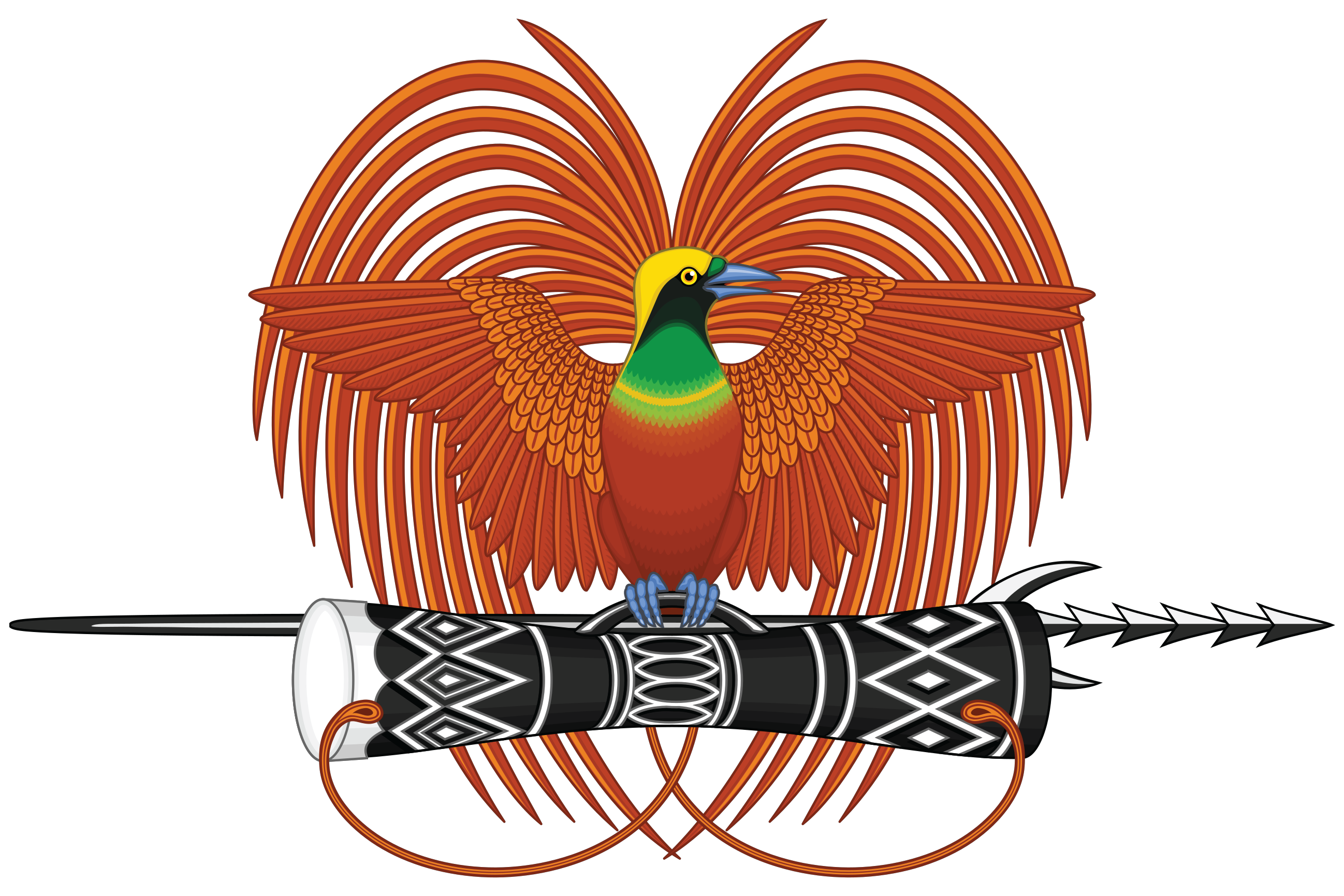
The Support to Rural Entrepreneurship, Investment and Trade in Papua New Guinea (EU-STREIT PNG) Programme is the largest grant-funded Programme of the European Union in the country and in the Pacific region. The Programme was developed under the umbrella of 11th European Development Fund (2014-2020) and is being implemented as a United Nations Joint Programme under the leadership of the Food and Agriculture Organization of the United Nations (FAO) as the leading agency/administrative agent and in partnership with the International Labour Organization (ILO), International Telecommunication Union (ITU), United Nations Capital Development Fund (UNCDF) and United Nations Development Programme (UNDP), and in close collaboration with the Government and local partners with an emphasis on local agripreneurs.
Programme Focus and Outcomes
The Programme focuses on three value chains of cocoa, vanilla and fisheries (aquaculture, riverine and in shore/reef) and aims to achieve an overall objective "To increase sustainable and inclusive economic development of rural areas" through a combination of two integrated outcomes: (1) Increasing the economic returns and opportunities from three selected value chains - cocoa, vanilla and fishery while; (2) Strengthening and improving the efficiency of value chain enablers including the business environment and supporting sustainable, climate-resistant transport and energy infrastructure development. The EU-STREIT PNG is the flagship programme for the Hand-in-Hand Initiative in Papua New Guinea.

Under outcome 1, major outputs include increased volume, value and improved quality of cocoa, vanilla and fisheries products, more value addition and an increased number of people and enterprises engaging in and benefiting from improved value chain development. Benefits planned include both increased income and enhanced food security and nutrition.
Under outcome 2, major outputs planned include an increased number of people employed, agripreneurs and micro, small & medium enterprises engaged in the selected value chains benefiting from reduced transaction costs and time, improved access to finance, increased availability and usage of digital tools and services. Increased availability of renewable energy, improved energy efficiency and access to rehabilitated roads, landing sites, and lower transport costs are also planned. While mainstreaming gender and youth, target beneficiaries include range of Value chain stakeholders, including local agripreneurs and micro, small & medium enterprises, farm families and their organizations. Women and youth are prioritized as beneficiaries with set targets and specific resources to be set aside to ensure their fullest engagement and benefit from Programme activities. The target beneficiaries will receive a range of direct and indirect benefits, which will motivate them to continue their engagement in the three value chains after the completion of the Programme and learn to integrate climate projections and adaptation in their operations. Direct benefits include increased income for producers, traders, agripreneurs and local micro, small & medium enterprises and enhanced adaptive capacity to climate change, as well as food security and nutrition. Indirect benefits include an improved policy, regulatory, business, and digital environment.
Based on lessons learned from previous European Union-funded programmes, substantive local government and community engagement in programme planning and implementation is foreseen, including throughout the planned 12 months inception phase. Complementary blending actions will be considered under the investment window of the European Union Pacific Regional Indicative Programme.
EU-STREIT PNG Approach
The EU-STREIT PNG Programme operates under the principles of the FAO Hand in Hand initiative, an evidence-based, country-led and country-owned initiative of FAO to accelerate agricultural transformation and sustainable rural development to eradicate poverty (SDG 1) and end hunger and all forms of malnutrition (SDG2]. In doing so, it contributes to the attainment of all the other Sustainable Development Goals.
The EU-STREIT PNG Programme uses the FAO-developed sustainable food value chain (SFVC) approach. A food value chain (FVC) consists of all the stakeholders who participate in the coordinated production and value-adding activities that are needed to make food products. An SFVC is a food value chain that: (1) is profitable throughout all of its stages (economic sustainability); (2) has broad-based benefits for society (social sustainability); and (3) has a positive or neutral impact on the natural environment (environmental sustainability).
The sustainable food value chain concept recognizes that value chains are dynamic, market-driven systems in which vertical coordination governance) is the central dimension and for which value addition and sustainability are explicit, multidimensional performance measures, assessed at the aggregate level. In the sustainable food value chain framework, value-addition refers to the difference between the non-labour cost of producing food and the consumer’s willingness to pay for it, adjusted for externalities.
The Programme itself embraces the sustainable food value chain concept and targets its focus value chains in two ways: (1) in component 1, it supports and develops various capacities of direct value chain actors in order to increase sustainability and profitability of the chains, with an intention to maximize value-addition across the whole VC and specifically upstream. The important part of a sustainable food value chain is to focus on women and youth in agriculture, so the value chains can become not only profitable, but inclusive as well; (2) in component 2, EU-STREIT PNG further focuses on the development and improvement of enabling environment and specific enablers around the value chains. This includes communications, infrastructure, renewable energy and capacities that improve value chain actors in their access to finance, knowledge, information and markets.
Implementing Agencies
- The Food and Agriculture Organization of the United Nations (FAO) is the leading Programme agency for the implementation of Programme Component 1 and parts of Component 2 with partners as hereunder.
- The International Labour Organization (ILO) lead the implementation of infrastructure development sections (roads improvement and maintenance mainly of Component 2.
- The United Nations Capital Development Fund (UNCDF) supports Component 2 of the Programme, especially the activities related to Access to Finance, Rural Banking and Cashless payment systems. Also supports the financial literacy of the beneficiaries and an improved business environment.
- The International Telecommunications Union (ITU) is responsible for the development of the telecommunications and ICT innovations and partnerships within Component 2 of the Programme.
- The United Nations Development Programme (UNDP) supports the implementation of Renewable Energy Policy and solutions within Component 2 of EU-STREIT PNG with a focus on selected public institutions.



